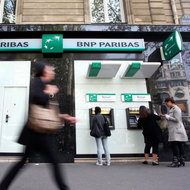 Chris Ratcliffe/Bloomberg NewsA BNP Paribas branch in Paris.
Chris Ratcliffe/Bloomberg NewsA BNP Paribas branch in Paris.
PARIS — Europe’s deepening debt crisis curbed trading revenue at the French bank BNP Paribas, pushing its net profit down by 13 percent in the second quarter compared to the same period last year.
Net income in the three months through June 30 fell to 1.85 billion euros, or $2.27 billion, from 2.13 billion euros a year ago, France’s largest bank said on Thursday.
Revenue from its advisory and capital markets operations, a mainstay of its business, slumped 33 percent to 1.2 million euros.
“Against a general background of crisis in the capital markets and strong volatility, there was less demand from clients and the businesses were managed cautiously,” the bank said.
At the same time, BNP Paribas said it had also significantly shored up the amount of capital regulators are requiring it and other financial institutions to hold in reserve against a worsening of the crisis.
The bank said it had completed 90 percent of a restructuring plan designed to bring in funds to lift its capital cushion to 9 percent by the end of the year to conform with new regulations.
Since the middle of last year, BNP Paribas, like other European banks, has moved to reduce its exposure to the crisis by shedding large amount of sovereign bond holdings from Greece and other troubled countries to help protect its capital levels. The bank took a write-down of 3.2 billion euros on Greek government debt in 2011.
BNP Paribas said its risk-related costs had fallen more than 20 percent in the first six months of 2012 compared to a year ago, to 1.8 million euros. That included a hit of 534 million euros it took in marking down the value of its Greek bond holdings in the second quarter of 2011.
The French bank said it continued lending into economies where it operates despite the difficult economic environment. As consumers reduced spending and stashed more money in their bank accounts, BNP Paribas said its commercial business was marked in particular by a growth trend in deposits across all its networks.
Revenue was stable at 3.96 billion euros compared to the second quarter of 2011, while operating expenses fell 1.2 percent from a year earlier.
In early morning trading in Paris, shares in the French bank rose 1.6 percent.
Article source: http://dealbook.nytimes.com/2012/08/02/bnp-paribas-profit-falls-13-in-second-quarter/?partner=rss&emc=rss

